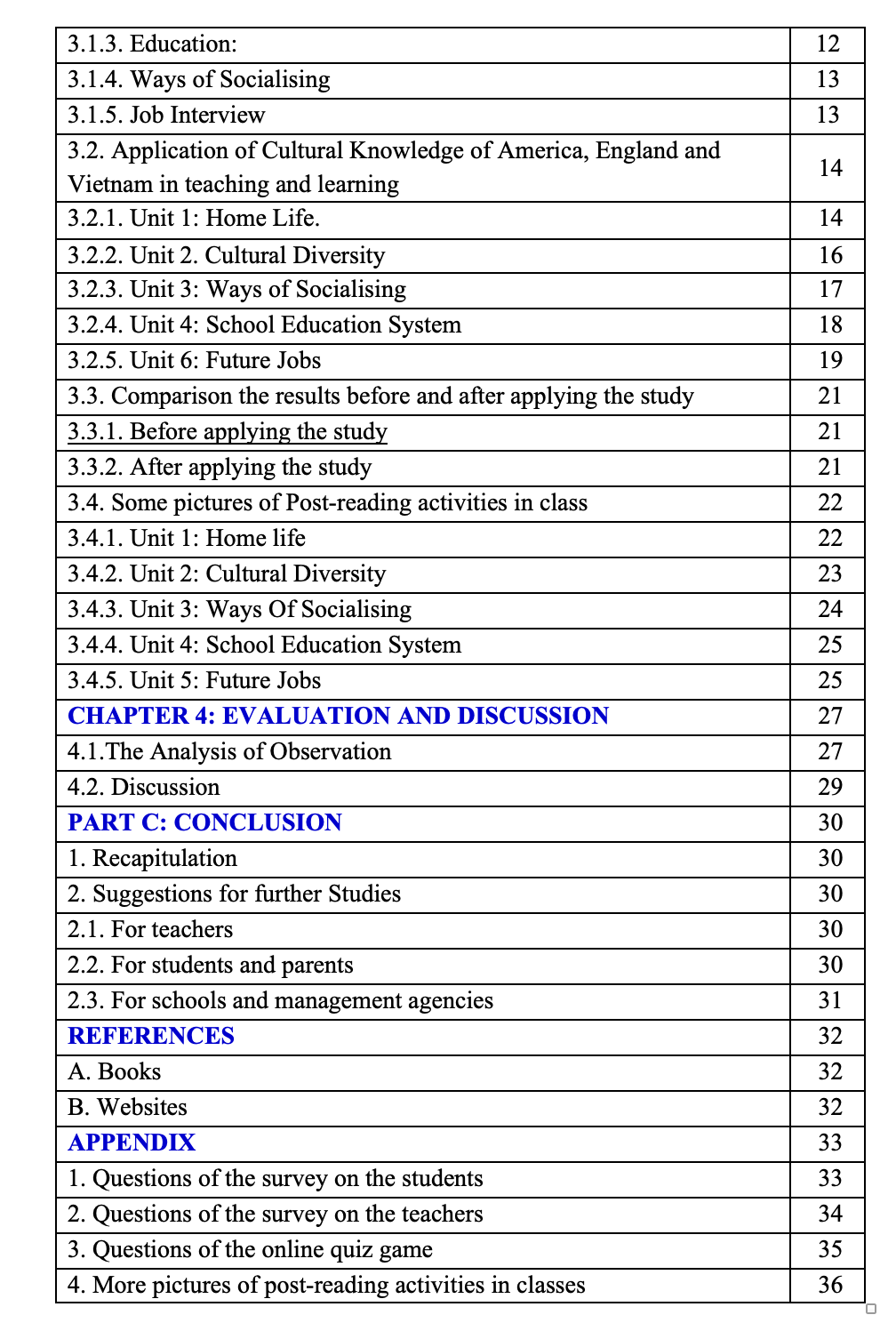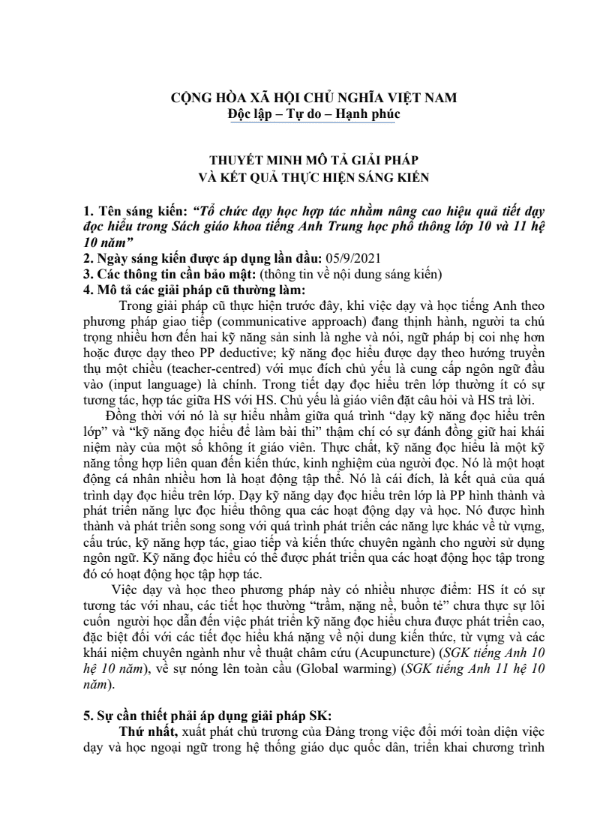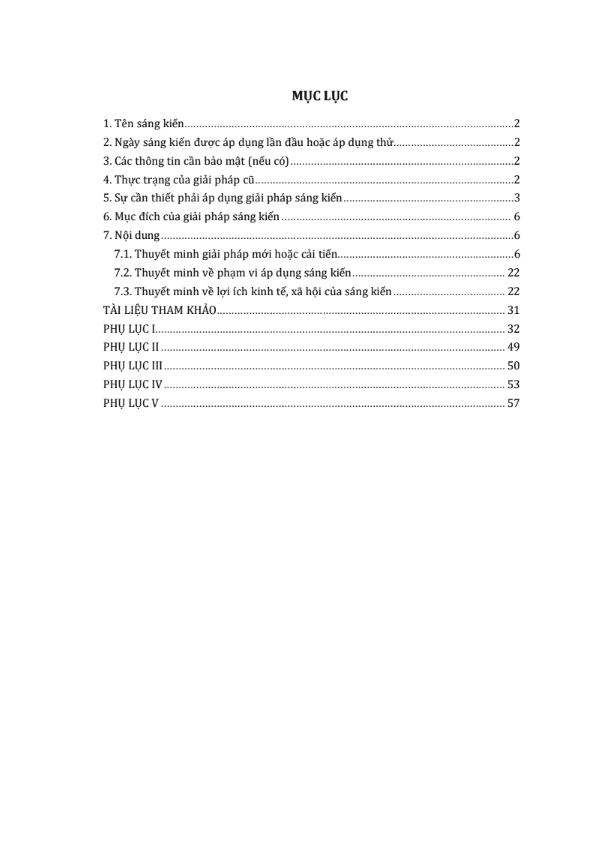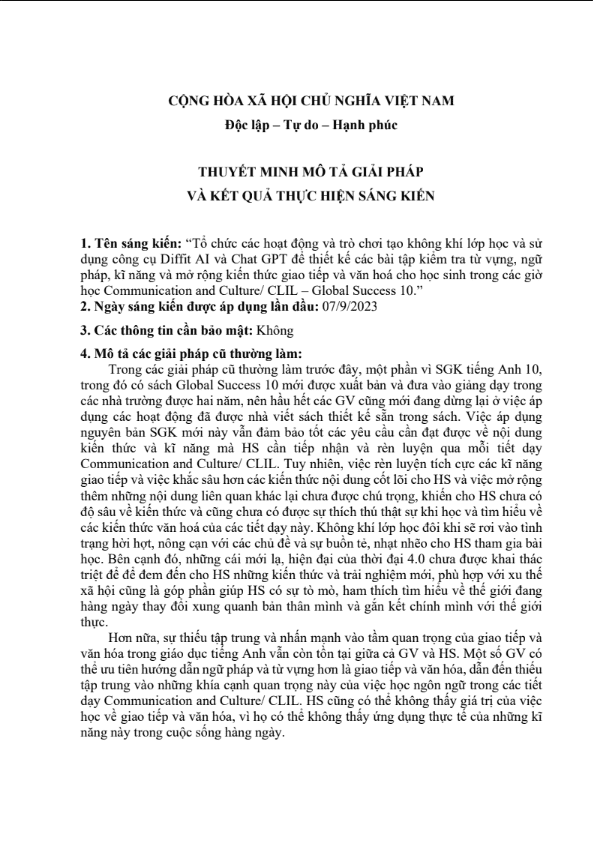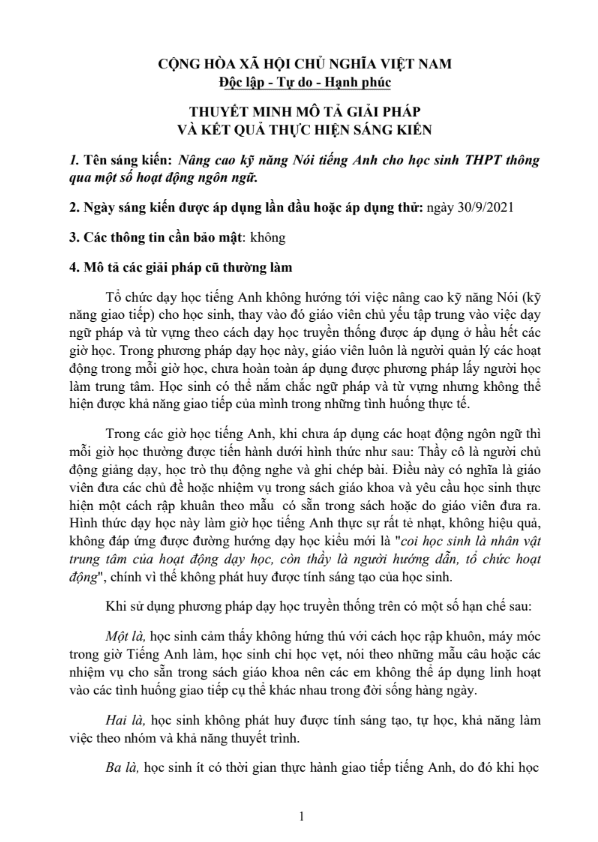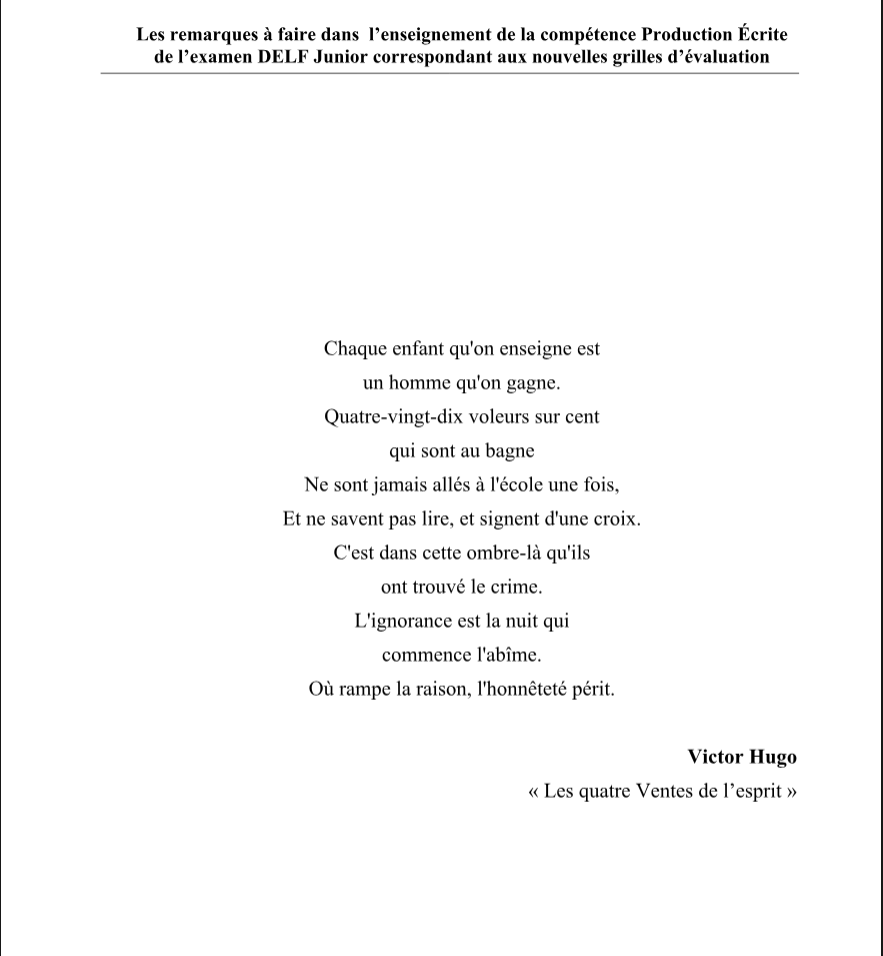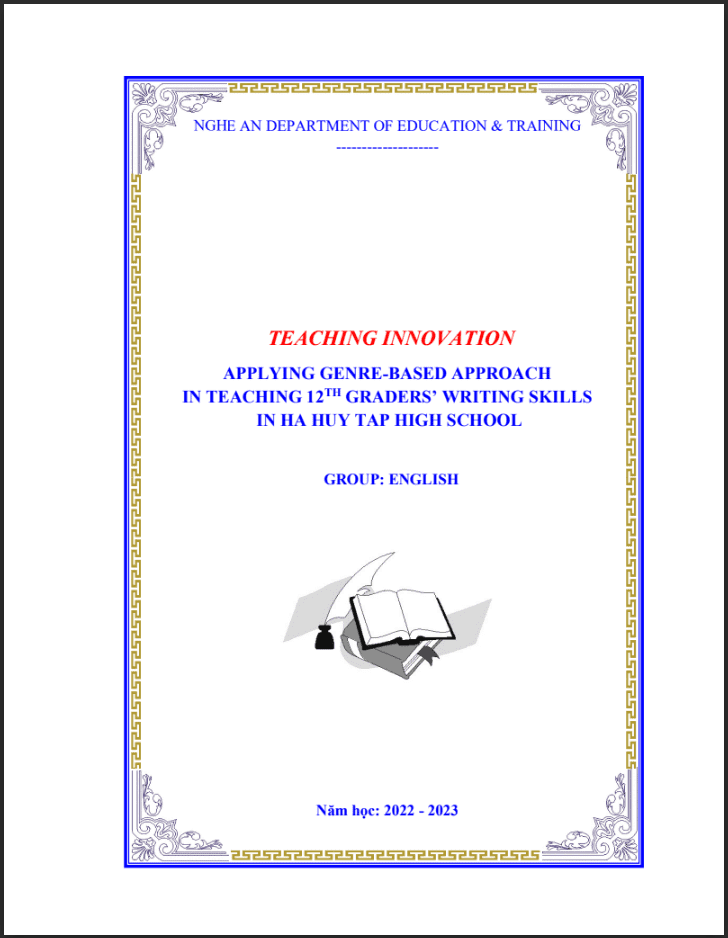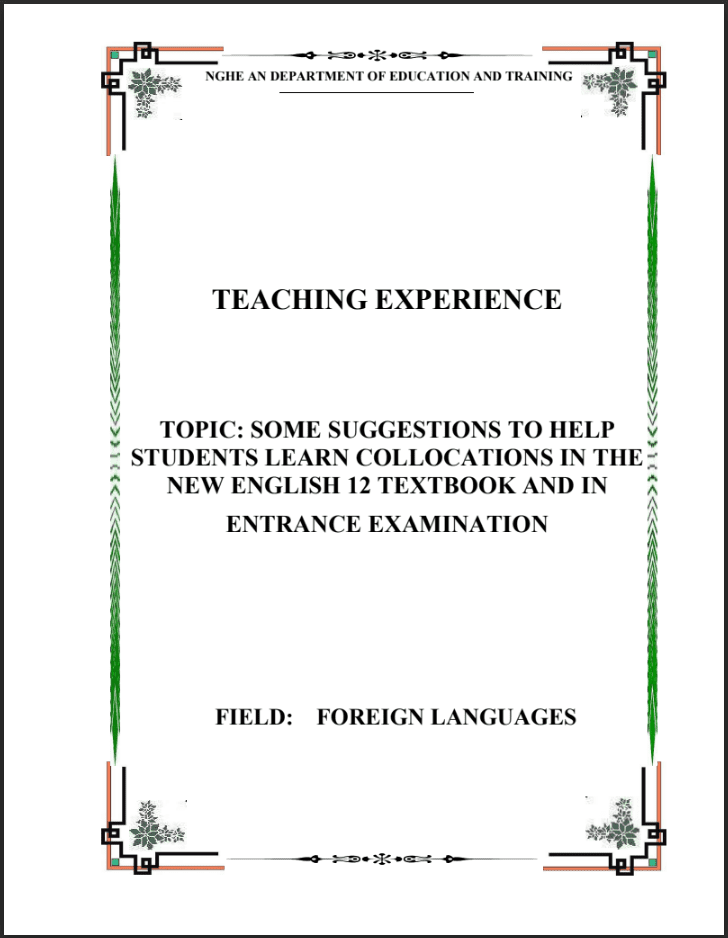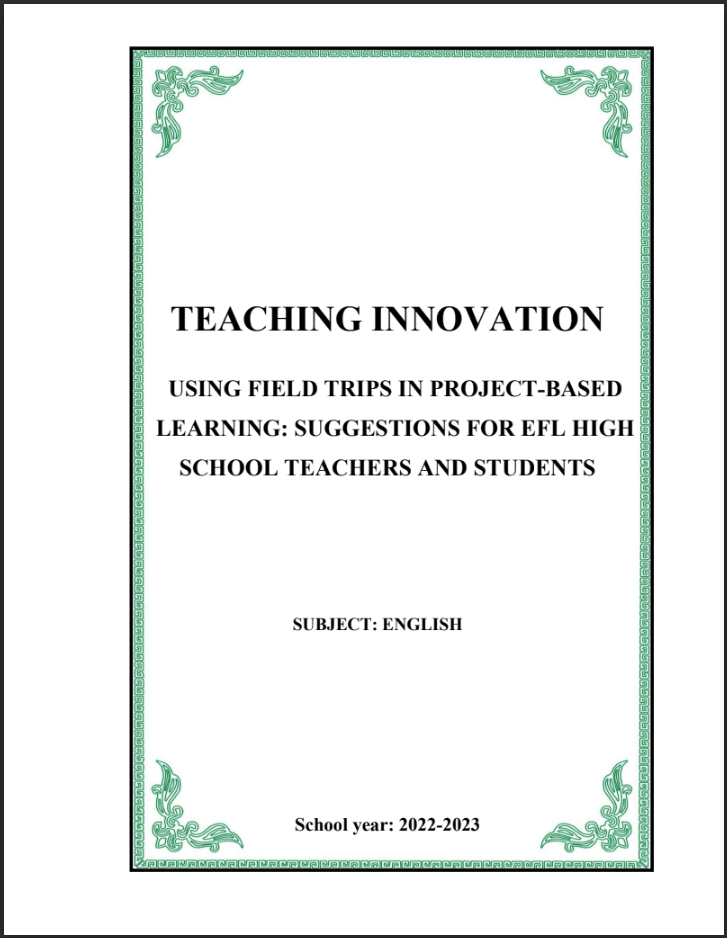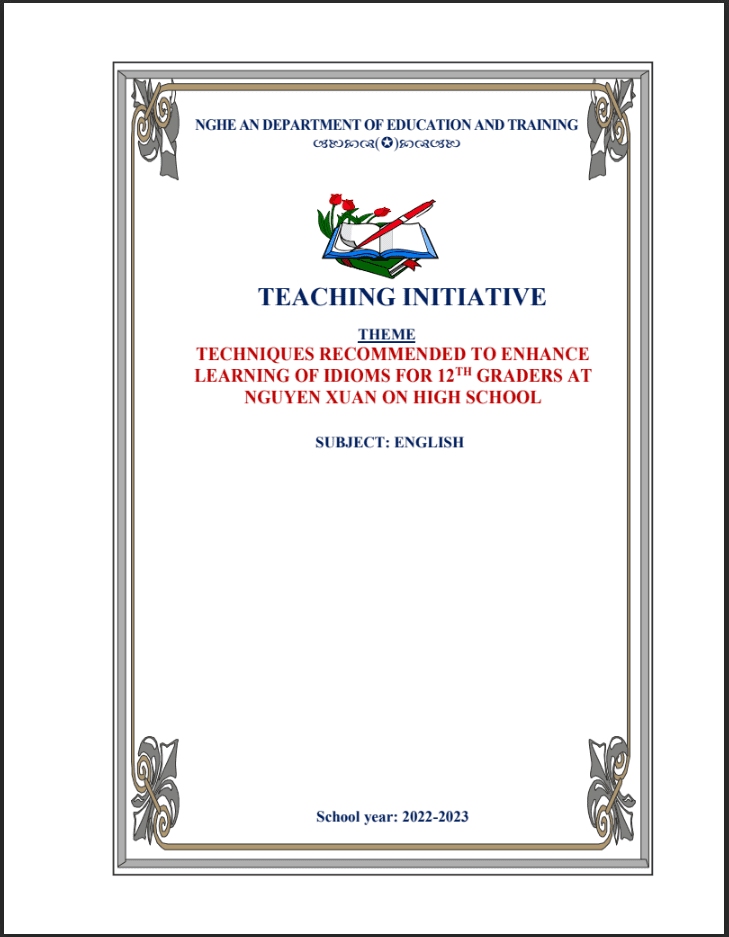SKKN Integrating some cultural knowledge of America, England and Vietnam to attract 12th graders in Post- Reading activity
- Mã tài liệu: MP0054 Copy
| Môn: | Tiếng anh |
| Lớp: | 12 |
| Bộ sách: | |
| Lượt xem: | 907 |
| Lượt tải: | 7 |
| Số trang: | 48 |
| Tác giả: | Nguyễn Thị Thanh Lan |
| Trình độ chuyên môn: | Thạc sĩ giáo dục |
| Đơn vị công tác: | THPT Nghi Lộc 5 |
| Năm viết: | 2021-2022 |
| Số trang: | 48 |
| Tác giả: | Nguyễn Thị Thanh Lan |
| Trình độ chuyên môn: | Thạc sĩ giáo dục |
| Đơn vị công tác: | THPT Nghi Lộc 5 |
| Năm viết: | 2021-2022 |
Sáng kiến kinh nghiệm “SKKN Integrating some cultural knowledge of America, England and Vietnam to attract 12th graders in Post- Reading activity“ triển khai gồm các biện pháp nổi bật sau:
Firstly, selected the grade 12th students to work out their attitude and feelings in English lessons.
Secondly, we collected and selected the suitable features of English,Vietnamese or American culture from books and from other sources.
Third, we designed the reasonable activities to conduct integrating the cultural understanding in the lessons.
The fouth, we carried out the activities chosen in a class.
The fifth, we made a survey to check the effect of those activities, we analyzed the data we got and did some necessary adjusts.
The sixth is applying the finding into some reading lessons for post -reading activities in more classes.
Mô tả sản phẩm
PART A : INTRODUCTION
- Rationale:
It cannot be denied that English has nowadays become a common means of communication of human beings all over the world. It is the official language in 67 countries and is spoken as a first language by around 400 million people worldwide. And in Viet Nam, English is included in the national curriculum as a compulsory subject both in schools and universities. Especially, there has been a trend recently that more and more Vietnamese students have chosen to study or work oversea in the hope of a brighter future. They believe that it will give them an open door to the world and help them not only communicate with global citizens but also offer them an opportunity to work in large corporations. Hence, learning English is particularly significant and that is the reason why most of Vietnamese students are making their great effort to master the language.
However, it is the fact that many of them can understand English grammar very well, and even score high marks in examinations, but their communicative skills are very poor and they are often not confident enough to strike up a conversation. For instance, their conversations are usually initiated by asking the opposite personal questions, such as “How old are you?’, “How many people are there in your family?”, or “Did you get married?”, which can easily make Western visitors annoyed and not eager to continue conversing any more. It can be seen from this example that the process of learning a foreign language not only requires an individual to practice linguistic forms but also necessitates to become familiar with the culture of target language.
In addition, if culture is integrated with the study of language, learners may derive long-term benefits from their language learning experience. Thus, culture learning can create motivation for language learning. Moreover, learners who gain certain cultural knowledge can come to be more well-informed and develop more positive attitudes towards other cultures. They not only acquire the knowledge of other cultures, but also increase their understanding of their own culture. Therefore, culture needs to be applied into the teaching of language and skills so that learners can get to know how to speak and write in culturally appropriate ways.
Besides, Vietnam has a long traditional culture with outstanding and typical customs and practices of a country in the East. Many conceptions of life, people, love, happiness, and clothes of Vietnamese people are sometimes a bit traditional and not as liberal and open-minded as people in many Western countries. That is why culture shock appears to be a common manifestation when moving to a new country. Culture hence needs to be a central focus in language teaching, so that students will be able to communicate to the fullest extent in authentic situations. The matter of fact we mentioned above inspired us to choose the topic
“Integrating some cultural knowledge of America, England and Vietnam to attract 12th graders in Post- Reading activity”. This study is conducted to find out some co-relative cultural knowledge, similarities and differences of those knowledge in the two languages. Furthermore, the study can achieve some ways to give practical activities effectively, especially for the high school students who need a lot of skills for a job or further studying in integrating era as a real citizen in the near future. Hopefully with the suggested techniques and tools, teachers can use them as a source of reference in their teaching process.
- Aims of the study:
The aims of this research are stated as follows:
- To investigate whether the cultural knowledge attract the students in post – reading activity.
- To find out the students’ attitude toward the lessons using the cultural knowledge of America, England and Vietnam.
- Methods of study:
-
- Study of theories
- Observation of real lessons.
- Analysis and Evaluation
4. Research questions
The following are the questions that should be answered related to the background of study:
- Is the cultural knowledge useful and effective to attract the students to do well in Post-reading activity?
2.What is the students’attitude toward the lessons using the cultural knowledge?
5. Scope of the study
This study focuses on observing and evaluating the effectiveness of using some cultural knowledge in Post-Reading activity, grade 12, carried out at Nghi Loc 5 Upper- secondary School.
6. Significance of the study
The main goal of the study is how to creat English practising activites to attract students to perform more actively and effectively in Post- Reading activity. We will focus on how to carry out post –reading stage using the cultural knowledge of America, England and Vietnam, how to organise its activities and how it impacts to students’ practical ability.
PART B: MAIN CONTENT
CHAPTER 1: THEORETICAL BACKGROUND
1.1. Post-Reading Activity in English Reading lesson
1.1.1. Role of Post-Reading Activity in English Reading lesson
Post-reading activities are defined tasks done after students have finished reading a text. These are usually carried out in order to help the learners more deeply understand what they have read. The post-reading stage of a reading lesson is often confused with the closing of a period. However, having new information from the while-reading stage should bring about a change such as the students would know more, or think or feel differently from before. In other words, at this stage, the students are in a temporary change of state or condition, that is, they now know something they did not know before. Teachers should help students connect the new information they are now familiar with and their lives.
Besides, post-reading activities give students the opportunity to review, summarize, and react to a reading passage, and activities such as debates, roleplays, games, and discussions take place in small and large groups, as well as with the entire class. Some post-reading exercises also assess how well the students have comprehended the reading material, and they often consist of a text followed by questions that check the comprehension of specific details, main ideas, and inferences.
The task of the post-reading stage is to integrate or synthesize the material that has just been read into one’s knowledge base of the topic. Students need to make their own material. This can be achieved through a variety of means employing writing, class discussion, visual representations, and physical demonstration.
1.1.2. Types of Post-reading Activities
It is suggested that Post-reading activities should tend to focus mainly on two skills: Speaking and Listening. The following are some suggestions:
- Main ideas list: Students list the main ideas of the text beginning with the most important to the least.
- Debate: Students can take specific sides of the topic and debate an issue.
- Hot seat: One student becomes the writer of the text or the character in the text, answer the classs’questions.
- Summarizing: This activity enables students to identify writer’s main ideas or recognize the purpose of the reading text.
- Role play: Some students act out as the characters in the text, which is one of the best ways to help students memorize the knowledge they have just gained, as well as develop other various skills.
- Discussing: The class can be divided into groups to discuss several sides of the topic; compare and contrast their ideas toward the issue.
1.1.3. Problems with Post-reading activity in class and Solutions:
In the process of teaching Post-reading stage, we have encountered some certain difficulties.
The first problem is that the texbook contains a great deal of knowledge from a huge variety of domains, which takes a lot of time to fulfill. And normally, the teacher spends most of the time handling pre- and while-reading stages to make sure that students can perceive the main content of the lesson. As a result, it is often complained that there is hardly enough time to organize an interesting activity for the Post stage.
In addition, students are often watching the clock during the last stage of the reading lesson, because there are not so many post activities that can hold students’ attention. They commonly find those designed in the syllabus uneasy or not have much practical value in their life life.
From this situation, we have tried to find out and design some motivating activities that can be easily applied in the Post-reading part as well as to draw students’ attention so that it can help them to inculcate the content of the Reading lesson.
1.2. The cultural knowledge relating to the topic of units
1.2.1. Some cultural knowledge relating to topic of reading lessons
The textbook English 12 contains many topics which are familiar with students. They are about family life, studying, job and society such as: Home life, marriage, education, ways of socialising, job interview, ect. Among those, there are a lot of similarities and differences about cultural knowledge that can be put in comparison between Vietnam and other countries to highlight the content that teachers want to emphasize and widen the student’s practical knowledge as well.
1.2.2. Benefits of using these cultural knowledge to improve post-reading activity
It is the fact that many of the post-reading activities in the textbook are designed in discussing and giving their opinions about a certain topic. Those can
TÀI LIỆU LIÊN QUAN
- 7
- 105
- 1
- [product_views]
- 5
- 173
- 2
- [product_views]
- 4
- 165
- 3
- [product_views]
- 4
- 129
- 4
- [product_views]
100.000 ₫
- 6
- 434
- 5
- [product_views]
100.000 ₫
- 2
- 507
- 6
- [product_views]
100.000 ₫
- 9
- 546
- 7
- [product_views]
100.000 ₫
- 4
- 409
- 8
- [product_views]
100.000 ₫
- 2
- 595
- 9
- [product_views]
100.000 ₫
- 0
- 538
- 10
- [product_views]

